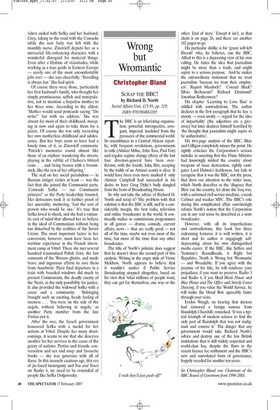Wrong but Wromantic
Christopher Bland SCRAP THE BBC! by Richard D. North Social Affairs Unit, £15.95, pp. 219, ISBN 9781904863205 The BBC is an infuriating organisation: powerful, introspective, arrogant, imperial, insulated from the pressures of the commercial world. Its resemblance to a Central African republic, with frequent revolutions, governments in exile (Alistair Milne, John Tusa, Paul Fox) and regular regime change (three of the last four directors-general have been overthrown, with the fourth, John Birt, escaping by the width of an Armani seam) is clear. It would have been even more marked if only Alastair Campbell had succeeded in his desire to have Greg Dyke's body dangled from the front of Broadcasting House.
So why not take the advice of Richard D. North and scrap it? The problem with that solution is that the BBC is still, and by a considerable margin, the best radio, television and online broadcaster in the world. It continually makes or commissions programmes in all genres — drama, comedy, current affairs, news — that are really good — not all of the time, maybe not even most of the time, but more of the time than any other broadcaster.
The title of North's polemic does suggest that he doesn't share the second part of this analysis. Writing in the angry style of Victor Meldrew, North appears to believe that it wouldn't matter if Public Service Broadcasting stopped altogether, based on his view that 'what millions of people want, they can get for themselves, one way or the other. End of story.' Except it isn't, as that claim is on page 26, and there are another 182 pages to go.
His particular dislike is for 'green soft-left liberals' who, he believes, run the BBC. Allied to this is a depressing view of his own calling. He hates the idea that journalism might be more than a trade, and might aspire to a serious purpose. And he makes the extraordinary statement that we trust journalists 'because we trust their employers'. Rupert Murdoch? Conrad Black? Silvio Berlusconi? Richard Desmond? Jonathan Rothermere?
His chapter 'Learning to Love Bias' is riddled with contradictions. The author declares in the first paragraph that he has 'a snooty — even snotty — regard for the idea of impartiality' (the adjectives are a giveaway) but later declares himself horrified by `the thought that journalists might aspire to be authoritative'.
His two-page analysis of the BBC, Blair and Gilligan completely misses the point. He rightly criticises the Corporation's serious mistake in asserting that the Prime Minister had knowingly misled the country about weapons of mass destruction, rightly castigates Lord Hutton's feebleness, but fails to recognise that it was the BBC, not the press, that drew our attention to the wider issue, which North describes as the 'disgrace that Blair ran the country, let alone the Iraq war, with a suborned civil service machine, a weak Cabinet and weaker MPs'. The BBC's role during this complicated affair convincingly refutes North's notion that the Corporation can in any real sense be described as a state broadcaster.
However, with all its imperfections and contradictions, this book has three redeeming features; it is well written, it is short and its author is engagingly selfdeprecating about his own distinguished media career. If the BBC, like Sellars and Yeatman's Roundheads, is Right but Repulsive, North is Wrong but Wromantic — and Wreadable. If you agree with the premise of his title, he will reinforce your prejudices; if you want to preserve Radio 3 and Radio 4, if you liked Bleak House and Blue Planet and The Office and Strictly Come Dancing, if you value the World Service, he will make the blood flow agreeably faster through your veins.
Evelyn Waugh, on hearing that doctors had removed a benign tumour from Randolph Churchill, remarked, 'It was a typical triumph of modern science to find the only part of Randolph that was not malignant and remove it.' The danger that any government would take Richard North's advice and destroy one of the few British institutions that is still widely respected and world-class has, despite the flaws in the recent licence fee settlement and the BBC's new and convoluted form of governance, happily receded for another ten years.
Sir Christopher Bland was Chairman of the BBC Board of Governors from 1996-2001.

























































 Previous page
Previous page